Top Educational Institutions Near International City, Dubai


Intro
When considering the education landscape in Dubai, it becomes imperative to explore the diverse range of institutions available. The area surrounding International City is no exception as it plays host to various educational facilities catering to children of different age groups and backgrounds. From local public schools to international private establishments, parents in this region have a myriad of choices, each with unique offerings.
Given the multicultural nature of Dubai, educational institutions reflect a blend of curriculums, teaching methods, and extracurricular activities that shape not only academic performance but also overall development for students. As families settle in this vibrant community, understanding the educational opportunities is essential. This ensures that they can provide their children with the best possible start to their academic journeys.
In this exploration, we'll delve into the specifics of several schools near International City. By taking a closer look at their academic programs, extracurricular offerings, and facilities, parents and guardians will gain insights necessary for making informed decisions regarding their children's education. Furthermore, this examination will reflect a broader understanding of how these institutions align within the greater Dubai educational ecosystem.
Overview of International City
Educational institutions are a crucial part of any community, and understanding the specifics of International City in Dubai is essential when evaluating schools. This area is not just a residential hub; it’s rich in diversity and opportunity, making it an ideal consideration for families looking to settle down.
Geographical Context
Positioned strategically along the Al Awir Road, International City is approximately 20 kilometers from the heart of Dubai. This locale is designed for convenience. Its proximity to major highways connects residents effortlessly to other parts of Dubai. The landscape is characterized by the unique architectural styles of various countries, which lends an intriguing international flair. The presence of significant landmarks and facilities, like Dragon Mart and the Dubai Silicon Oasis, enhances both living standards and accessibility.
Living in such an ideally located area means families can benefit from a balanced lifestyle. They have access not only to their homes but also to schools, parks, and shopping centers. As the area is well-served by public transport, reaching educational institutions is a breeze, which alleviates daily struggles for parents and students alike.
Community Demographics
The demographic makeup of International City is immensely diverse. Residents hail from dozens of different countries, which fosters a multicultural environment. This melting pot of cultures creates a vibrant community where children can experience varied perspectives and backgrounds. Inhabitants include a mix of expatriates, predominantly from South Asia, the Middle East, and Eastern Europe, which contributes to a unique social fabric.
Families in this area are typically looking for schools that not only cater to academic needs but also respect cultural nuances. Many educational institutions nearby offer international curricula, which tend to be more inclusive of diverse student bodies.
The growth of the community also hints at increasing demand for quality educational services. With more families moving into the area, schools must adapt and expand their offerings to meet the expectations of parents and align with future developments.
As a result, education in and around International City represents more than mere schooling; it is about crafting well-rounded global citizens who are equipped to thrive in an interconnected world.
In summary, International City presents a valuable mix of location and community that parents should seriously consider when exploring educational options for their children.
Importance of Education in Dubai
Education is more than just filling young minds with knowledge; it’s about shaping futures. In a rapidly evolving metropolis like Dubai, the importance of education can’t be overstated. Quality educational institutions serve as the backbone of every thriving community, ensuring that families not only settle down but flourish.
Government Regulations
The Dubai government plays a pivotal role in regulating the education sector, establishing standards to ensure that students receive quality education. The Knowledge and Human Development Authority (KHDA) is instrumental in this regard, monitoring educational institutions and implementing educational reforms.
- School Inspection Framework: Schools are assessed on various parameters, such as teaching quality, student experience, and performance outcomes, pushing institutions towards excellence.
- Curriculum Standards: The KHDA mandates that all schools adhere to a curriculum that meets both local and international standards, ensuring that students are prepared for an interconnected world.
- Inclusion Policies: Furthermore, there are regulations in place to support students with disabilities and special needs, fostering an inclusive environment that benefits everyone.
Such regulations not only protect students but also assure parents that they are investing in a nurturing environment for their children. This oversight cultivates trust, motivating families to choose Dubai as their home, knowing that education is prioritized amid the city's swift developments.
Cultural Context
Dubai’s vibrant cultural tapestry significantly influences its educational landscape. With a melting pot of cultures represented by residents from various nationalities, schools here cater to diverse backgrounds and educational philosophies. This cultural richness leads to unique educational benefits:
- Multilingual Education: Many institutions offer instruction in multiple languages, including Arabic, English, and others, accommodating the linguistic needs of expatriate families.
- Global Perspectives: Students are exposed to different worldviews, enhancing their understanding of global issues, which is vital in today’s interconnected society.
- Cultural Sensitivity: Schools often celebrate various cultural events, teaching children to respect and appreciate diversity.
Education in Dubai, therefore, is not just about academics. It’s about nurturing global citizens who can navigate and contribute to an array of cultures. The implications of cultural context on education are profound, as they prepare students not just for exams, but for life beyond school walls.
"Education is the most powerful weapon which you can use to change the world." - Nelson Mandela
Types of Schools Available
Understanding the diverse array of educational institutions near International City is crucial for parents seeking the best educational options for their children. This section provides an in-depth look at the types of schools available, encompassing public schools, private schools with international and national curricula, and specialized institutions. Each type presents unique benefits and considerations that shape the educational landscape of the region.
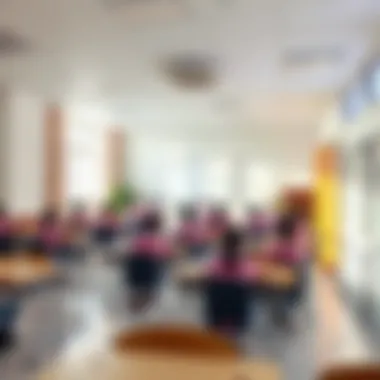
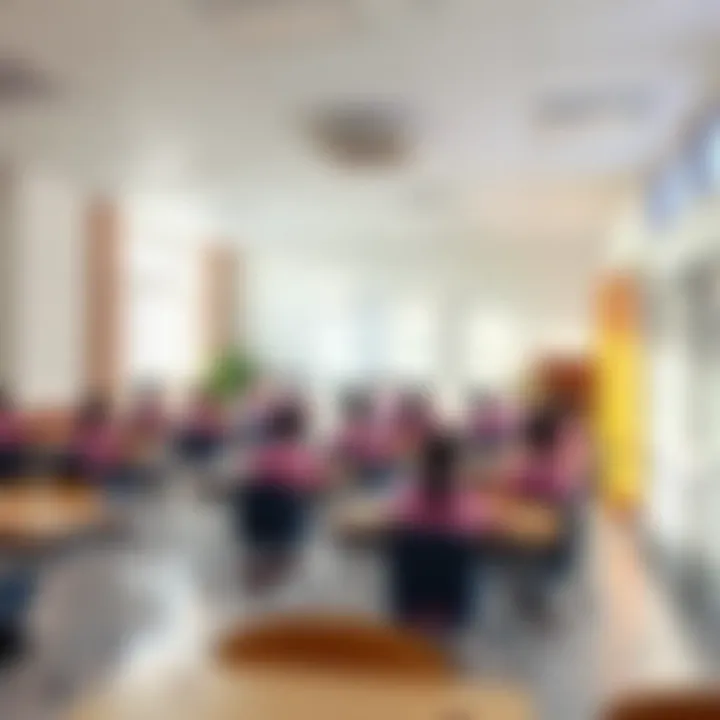
Public Schools
Public schools in Dubai, funded by the government, offer a cost-effective education option for families. They follow a structured curriculum overseen by the UAE's Ministry of Education, ensuring that every child receives a standardized education. Many public schools cater to a diverse student body, which can foster a rich multicultural environment.
One of the main advantages of public schooling is accessibility. Families residing in International City can rest assured that enrolment is often straightforward for residents. However, it’s vital to note that waitlists may be the norm at popular institutions, thus encouraging timely applications.
The curriculum typically includes Arabic language studies and Islamic education, reflecting the national ethos. While some public schools are pressured under larger class sizes, others have made strides in enhancing their facilities and resources. Parents looking into this avenue should consider not just academic performance but also social development in a large student pool.
Private Schools
Private schools offer an alternative to public education, appealing to families looking for specific curricula and learning environments. This category can be divided into schools offering international and national curricula, each tailored to different aspects of student learning and development.
International Curricula
International curricula are designed to cater to a global audience, such as the International Baccalaureate (IB) and British A-Level programs. These curriculums emphasize critical thinking, creativity, and student autonomy. A key characteristic of international schools is their focus on preparing students for higher education worldwide. Many of these schools have a diverse faculty, often comprising educators from various countries, enriching the learning experience.
The advantage of international curricula lies in their recognition by universities across the globe, making it a popular choice for expatriate families and those aspiring for future overseas studies. However, parents should also be mindful of the higher tuition fees and the potential for a more competitive atmosphere in admissions and classroom settings.
National Curricula
Conversely, national curricula such as the UAE Ministry of Education framework emphasize the importance of local culture and values. National curricula typically prioritize Arabic language development and subjects fundamental to the UAE's history and societal norms. This curriculum is especially attractive to local families wanting their children to retain and deepen their connection to their heritage.
An important feature of these schools is their integration of Emirati culture within the educational ethos, providing students with a grounded sense of identity. While often more affordable than international alternatives, national schools may not offer the same level of international exposure and recognition. Balancing a child’s cultural connection with global opportunities can be a challenging decision for parents.
Specialized Institutions
Specialized institutions cater to students with unique educational needs or interests. These include schools focusing on arts, sciences, or special education. Institutions like these recognize that a one-size-fits-all approach doesn’t suit every learner. They provide tailored curricula and support systems that encourage the growth of individual talents and skills.
For instance, arts-centered schools emphasize creative expression, equipping students with skills applicable to various artistic disciplines. Meanwhile, institutions focusing on special education are dedicated to providing an inclusive environment that tailors teaching methods to accommodate different learning abilities. This consideration not only shows a commitment to diversity in learning but also emphasizes the importance of personal development in educational settings.
In summary, the types of schools available near International City reflect the rich diversity of educational approaches and philosophies, catering to various needs and preferences. When parents evaluate these options, they should weigh the benefits and considerations carefully, keeping their children's future aspirations in mind.
Key Schools Near International City
In the vibrant landscape surrounding International City, varied educational institutions stand as beacons for families seeking quality education for their children. These schools not only cater to the academic needs but also focus on holistic development—a significant consideration for many parents. Choosing the right school is pivotal as it lays the foundation for a child’s future success, both academically and personally. With such diverse options available, from rigorous academic programs to rich extracurricular activities, parents have numerous opportunities to find a proper fit that aligns with their expectations and values.
School A - Overview
Academic Programs
The academic programs offered at School A are tailored to create a well-rounded educational experience. They follow an integrated curriculum that often combines various subjects, encouraging students to connect knowledge across disciplines. One standout feature is their focus on inquiry-based learning, prompting students to ask questions and engage deeply with the material. This characteristic not only keeps pupils intellectually engaged but also fosters critical thinking skills—something that is highly advantageous in today’s rapidly changing world. On the downside, the rigorous academic expectations might be overwhelming for some students who thrive in a less intense environment.
Facilities
Facilities at School A are top-notch, with state-of-the-art classrooms and well-equipped laboratories that make learning both effective and enjoyable. The school prides itself on offering an array of resources, including a comprehensive library and vibrant sports complex. Such unique features create an enriching atmosphere that supports both learning and leisure. However, the limited outdoor space compared to larger institutions may pose a concern for parents seeking ample play areas for their children.
Extracurricular Activities
Extracurricular activities at School A extend beyond the traditional boundaries, providing a plethora of options for students to explore their interests. From robotics clubs to art classes and competitive sports, there's something for everyone. This wide-ranging engagement helps students develop teamwork and leadership skills, enriching their school experience. The challenge, though, might be finding the right balance between academics and these activities, as students may feel pressured to participate in multiple programs to enhance their resumes.
School B - Overview
Academic Programs
School B takes pride in its progressive academic programs that align with international standards. Their curriculum emphasizes STEM education alongside the arts, allowing for creative expressions alongside scientific inquiry. This blend makes it a favorable choice for parents who value a diverse approach to education. A point to consider, however, is that the curriculum’s flexibility can sometimes lead to inconsistency in learning outcomes among different groups of students.
Facilities
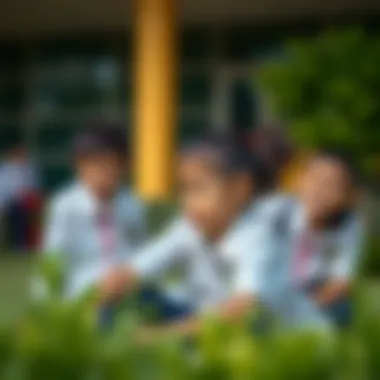
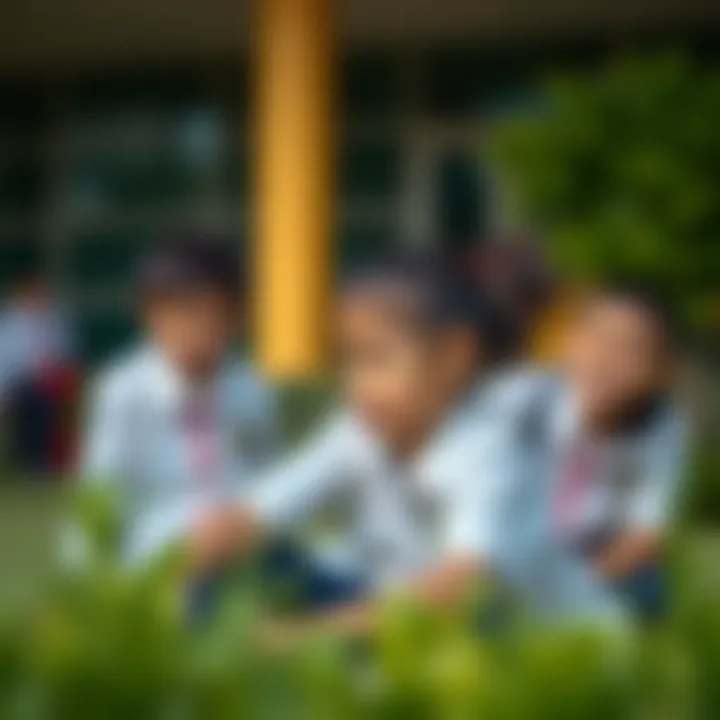
The facilities at School B are well-organized and modern, enhancing the overall learning experience. Classrooms are spacious and equipped with the latest technology, promoting an interactive educational environment. Additionally, the outdoor areas are not just playgrounds but multipurpose spaces that accommodate various sports and community events. Nonetheless, it is crucial to note that the large school population sometimes leads to competition for resources and space during peak hours.
Extracurricular Activities
With a keen focus on all-rounded development, School B offers a rich array of extracurricular activities that include debate clubs, music bands, and service projects. Participation in these activities is highly encouraged, as they help foster strong social connections and develop essential life skills. However, parents might want to keep an eye on their child’s commitments, as juggling academics with extracurriculars can become a tightrope walk.
School - Overview
Academic Programs
At School C, the academic programs are innovative and emphasize personalized learning pathways. This approach is beneficial for children who learn at different paces or possess varied interests. The combination of individualized attention and group learning empowers students to own their learning journeys. A drawback to consider is that this model requires significant parental involvement and advocacy, which may not be feasible for all families.
Facilities
The facilities at School C are thoughtfully designed, featuring sensory-friendly classrooms and quiet zones aimed at accommodating diverse learning needs. The school also has a dedicated space for arts and crafts, enhancing student creativity. Although the versatility of these facilities greatly benefits students, the limitations in technology resources may hinder those interested in tech-related subjects.
Extracurricular Activities
Extracurricular offerings at School C are uniquely focused on environmental awareness and sustainability, engaging students in projects that promote eco-friendliness. This initiative not only nurtures activism among youth but also encourages teamwork and community service. Still, the niche focus might not resonate with every student, leaving some to seek additional programs elsewhere to round out their interests.
In summary, the schools near International City provide a diverse array of programs and facilities, each with its unique advantages and challenges.
By understanding the offerings of each institution, parents can better navigate their options to find the best educational fit for their children.
Assessment of Educational Quality
Understanding the educational quality in institutions near International City is vital. It goes beyond mere rankings; it shapes the future of students and impacts the community as a whole. Parents naturally want the best for their children, and assessing educational quality helps in making informed decisions. Good educational quality can lead to better job prospects, well-rounded individuals, and a more engaged community.
Accreditation Bodies
Accreditation makes a difference. It signifies that a school meets certain standards of quality. Various organizations are responsible for accrediting schools in Dubai. These bodies ensure that educational institutions comply with set criterias. For instance, the Knowledge and Human Development Authority (KHDA) is an important player in Dubai, evaluating schools to uphold quality. Knowing whether a school is accredited can help parents gauge the adequacy of education provided. It’s like a stamp of approval.
Performance Metrics
Standardized Testing
Standardized testing is a common method used to gauge educational effectiveness. These tests usually remain uniform, allowing for fair comparisons among students. They serve as a measure of what the students have learnt. In this way, standardized tests also highlight a school's strengths and shortcomings. A notable characteristic of these tests is that they can objectively assess student performance across different institutions. They’re seen as beneficial for identifying areas that need improvement and provide quantifiable data for many stakeholders.
However, while standardized tests offer certain advantages, they also possess disadvantages. For one, they might not capture a student's full potential or abilities, as some may excel in practical applications but not in exam formats.
Parent and Student Satisfaction
Parental and student satisfaction is another crucial aspect of educational quality. This measurement involves collecting feedback from those directly involved — the students who experience the learning environment and the parents who invest emotionally and financially. High satisfaction levels can indicate a positive atmosphere, dedicated teachers, and effective learning strategies in place. Schools often conduct surveys to gather such feedback.
“A satisfied parent or student can be the best advertisement for a school.”
However, one must consider that satisfaction is subjective. What pleases one parent may not please another. Thus, while satisfaction can indicate a school’s effectiveness, it should not be the only metric relied upon. Balancing satisfaction with other quantifiable measures ensures a comprehensive understanding of educational quality.
In summary, assessing educational quality requires a multifaceted approach. Accreditation, performance metrics, and satisfaction levels serve as essential tools in this quest. Each element plays a crucial role in shaping informed decisions regarding education near International City.
Extracurricular Opportunities
Extracurricular activities are not just a footnote in a student’s education; they are an essential component that adds layers to academic experiences. In the educational landscape surrounding International City, Dubai, these opportunities play a crucial role in fostering personal growth, social skills, and community engagement among students. As the demand for comprehensive development rises, understanding these programs helps parents make informed choices about their children’s schooling.
Sports Programs
Schools in and around International City offer a variety of sports programs that go beyond physical fitness. Participating in sports cultivates discipline, teamwork, and resilience, which are attributes that students carry throughout their lives.
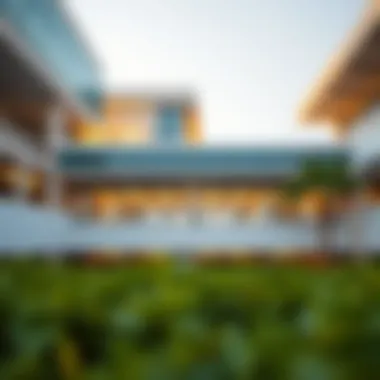
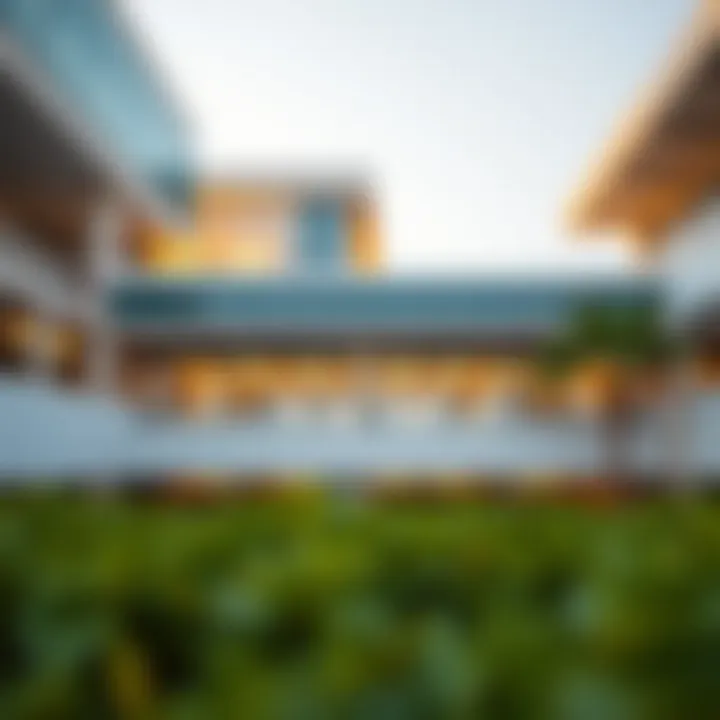
- Diversity of Offerings: From soccer to basketball, swimming to athletics, students can choose from various sports tailored to both beginners and advanced players. This wide selection encourages them to explore their interests and find their niche.
- Health Benefits: Regular physical activity is vital for physical and mental well-being. It helps combat stress and anxiety while promoting a healthier lifestyle among students, which is increasingly important in today’s fast-paced world.
- Community Engagement: Sporting events often bring together families, creating a sense of belonging and community. These events allow parents to get involved and forge connections with other families, enriching the educational experience for everyone.
Schools generally facilitate friendly competitions with neighboring institutions, enhancing camaraderie and sportsmanship among young athletes. Development in sports can lead to long-term benefits, possibly even scholarships or professional avenues for those who excel.
Arts and Culture Activities
In an age where creativity and emotional intelligence are prized, arts and culture activities serve as vital outlets for self-expression and cultural awareness. Educational institutions in the area recognize the significance of nurturing creative talents.
- Skill Development: Engaging in arts—be it music, theatre, or visual arts—promotes cognitive development and critical thinking. Students learn to convey their thoughts and feelings through various mediums, enriching their communication skills.
- Cultural Awareness: The multicultural environment of Dubai makes exposure to diverse artistic expressions especially beneficial. Schools often celebrate cultural events that incorporate various art forms, fostering an understanding and appreciation of global cultures among students.
- Building Confidence: Performing arts, such as drama and music, empower students to step out of their comfort zones. Whether through school plays or concerts, they build essential life skills like public speaking and confidence, which serve them well in many facets of life.
As a result, extracurricular programs focusing on arts and sports contribute significantly to the holistic development of students, preparing them not just academically, but socially and emotionally for the challenges that lie ahead.
"A well-rounded education feeds into the mind and spirit - balancing academics with artistic and athletic endeavors is the key to nurturing a future leader."
Parental Involvement and Community Engagement
In today’s increasingly interconnected world, the role of parents in the educational journey of their children cannot be understated. This holds particularly true near International City, where diverse educational institutions thrive. Parental involvement enriches the educational experience, fostering a sense of community and belonging. When parents actively engage with schools, students benefit academically and emotionally. This engagement often leads to improved student performance, better behavior, and a more positive attitude towards learning.
By working hand-in-hand with teachers, parents can reinforce the curriculum at home, ensuring that children grasp key concepts and develop a love for education. Moreover, when parents are involved, schools often experience elevated morale. This sense of community encourages a supportive environment, which can make school a more enjoyable place for both students and teachers.
In this section, we will discuss two key facets of parental involvement: Parent-Teacher Associations and community events and activities, both of which serve as vital platforms for enhancing the educational landscape around International City.
Parent-Teacher Associations
Parent-Teacher Associations (PTAs) play a significant role in bridging the gap between home and school. These associations provide a forum for parents and teachers to collaborate, united by a common goal: the welfare of students. PTAs serve several functions.
- Facilitating Communication: They offer a structured way for parents to voice concerns and inquiries, thus fostering a two-way dialogue. This communication helps teachers understand student needs better.
- Organizing Supportive Activities: PTAs often initiate events such as workshops, fundraisers, and family nights. These activities encourage parent participation and promote a sense of belonging within the school community.
- Advocating for Student Needs: A strong PTA can influence school policies and advocate for resources that enhance student learning. Through collective efforts, parents can push for improvements that directly benefit their children.
"Parental involvement sets the stage for a lifelong appreciation of learning."
In various educational institutions around International City, energetic PTAs are actively engaged, reflecting the community's strong investment in education. Parents collaborating with teachers can often voice their unique perspectives, enriching the school environment.
Community Events and Activities
Community events and activities are vital for fostering a vibrant educational ecosystem. These events not only promote school spirit but also build relationships among families, extending the concept of learning beyond the classroom.
- Cultural Festivals: Many schools in the vicinity hold cultural festivals that celebrate the diverse heritage of their students. These events offer an opportunity for parents to share their traditions and engage with one another, strengthening community ties.
- Workshops and Seminars: Schools regularly host workshops on various topics like parenting skills, educational technology, and mental well-being. Such sessions empower parents with knowledge and resources, enhancing their ability to support their children’s education.
- Sports and Arts Events: Sports days and art exhibitions rally families together, showcasing students’ talents while fostering camaraderie among participants. These collaborative experiences help parents to connect with each other, creating a strong network of support.
In summary, parental involvement and community engagement are pivotal to shaping the educational environment near International City. By actively participating in PTAs and community events, parents not only enhance their children's educational experience but also contribute to the broader community's vitality.
Implications for Future Development
The implications of future development in the educational landscape surrounding International City hold significant weight for residents and stakeholders. As Dubai continues to transform into a global city, the evolution of its educational institutions is paramount. Understanding these implications can influence choices made by parents, investors, and even developers in pursuit of community growth and sustainability.
Emerging Trends in Education
In recent years, the education sector has experienced seismic shifts. Here are the most notable trends shaping schools near International City:
- Personalized Learning: Tailoring educational experiences to align with individual student needs has gained traction. This method recognizes varied learning styles, allowing for a more individualized approach that seeks to keep students engaged.
- Project-Based Learning: This hands-on technique emphasizes real-world problem-solving as students work through projects. Schools are adopting it to prepare students for the challenges they will face in the workforce.
- Emphasis on Soft Skills: Schools are increasingly integrating lessons on communication, teamwork, and adaptability into curricula. This prepares students not just academically but for societal integration.
- Focus on Mental Health: A growing recognition of the importance of mental well-being has led to initiatives that promote emotional health alongside academic readiness.
"The way we teach is changing, reflecting more than just knowledge acquisition, but preparing students for a cohesive societal role."
Impact of Technology on Learning
The integration of technology into education has transcended merely using laptops in classes. Now, it is reshaping how students learn, interact, and engage. Here are a few ways technology is leaving its mark:
- Blended Learning: This model mixes traditional classroom instruction with online learning. It allows for flexibility in learning and caters to diverse student needs.
- Access to Resources: Digital platforms provide students expansive access to educational material ranging from e-books to video lectures. This democratizes learning, ensuring that even the least privileged have access to quality resources.
- Data-Driven Decisions: Schools increasingly rely on data analytics to assess student performance and adapt teaching strategies accordingly. This can lead to timely interventions for students who may be struggling.
- Gamification of Learning: Elements of game design are being integrated into education, making lessons more engaging and resources less daunting.
As the landscape of educational institutions near International City evolves, the trends and technological impacts delineated here provide a deeper understanding of the future of learning in Dubai. For anyone looking to make informed decisions regarding education, keeping these factors in focus is essential.
For more detailed insights on educational trends, visit Wikipedia or Britannica for comprehensive overviews.
Ultimately, these shifts not only redefine teaching and learning but also shape the future of the community at large, reinforcing the interconnectedness between education and societal development.





